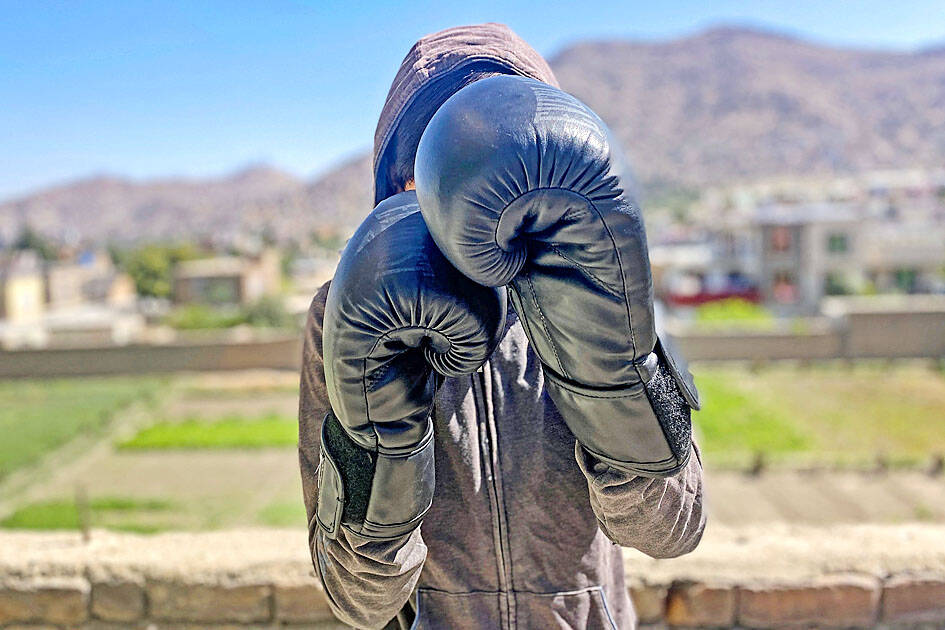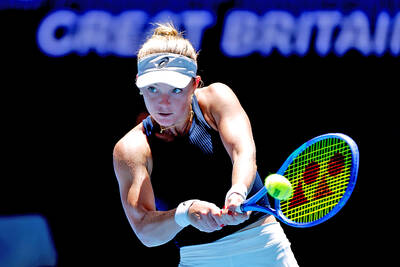Most mornings after praying, 25-year-old Sanah joins several women from her neighborhood in the Afghan capital, Kabul, for a walk along the main road before it fills with traffic, never jogging or getting too near to the many Taliban checkpoints.
They exercise secretively, and not for competition, but for a modicum of health and peace of mind in a country where the Taliban government have stopped women from playing sports.
“We cannot go near the Taliban checkpoint because they say: ‘Why are you outside the house so early? Where are you going? Why do you need to exercise, you don’t have to, so don’t’,” said Sanah, whose name has been changed — along with all the women interviewed — for fear of reprisal.

Photo: AFP
The Taliban authorities have implemented an austere interpretation of Islamic law, with women bearing the brunt of restrictions that the UN has labeled “gender apartheid.”
In November 2022, the Afghan Ministry for the Propagation of Virtue and the Prevention of Vice announced that women were barred from parks and gyms on the grounds they were not adhering to a dress code that orders them to cover up.
Gyms had previously offered time slots for women, and while some informal women-only fitness clubs still exist, they are rare and low-profile.
Sanah and one of her companions, Latifah, who is middle-aged, used to walk in the large, tree-lined parks in the city.
The last time Latifah went to the park near her house, not long after they were permanently closed to women, she said she was forcibly removed, crying as she recalled the incident.
“The doctor told me to exercise more because I have high cholesterol and fatty liver, but the Taliban don’t let us exercise or go to the gym or walk [freely] outside,” she said.
Sanah yearns to become a yoga teacher and guides the group through some gentle aerobic exercises and meditation after their walk.
Pressing her thumb and forefinger together on her knees in the yellow dawn light, away from prying eyes on a protected balcony, Sanah says softly, “Take a deep breath.”
Forced out of their gym, Rayan and a few fellow women boxers instead visit a friend’s home and use what little equipment they have to practice in a society that was already hostile to women in sport, but has now turned draconian.
“We train less, but we never stopped,” said the 19-year-old Rayan, watching a video on her cellphone in which her fists fly in jabs and hooks — a bittersweet reminder of the avid boxer she once was.
Pulling her headscarf off in a private garden in the Kabul heat, fellow former competitive boxer Bahar said the situation had left her and other Afghan women stressed, exhausted and low.
“But when we box, it pushes all that away for a moment. Even if we only train for a few minutes it makes a big difference,” the 20-year-old said, the henna from her recent wedding still staining her hands.
Her husband does not know she still boxes. Many women athletes fled Afghanistan after the Taliban takeover.
Some still compete on the international stage, including at the recent Paris Olympics, but they come from outside the country and under the flag of the ousted Islamic Republic of Afghanistan.
The Taliban authorities are not officially recognized by any state.
“In Afghanistan, girls’ sports have been stopped. When girls’ sport isn’t practiced, how can they join the national team?” said Atal Mashwani, spokesman for the Afghan General Directorate of Physical Education and Sport.
Banafsha, a black belt in the Chinese martial art of wushu, voiced the mixed feelings echoed by others about Afghan women’s Olympic participation.
The Afghan team in Paris had three men and three women, while Afghan women also competed in the Refugee Team.
“It made me happy that women haven’t surrendered yet, they are committed to their goals,” she said. “But I was also sad. Why can’t they go to the Olympics from within their own country?”
The former national competitor burned her uniform when the Taliban took power. These days she can barely leave the house and struggles to motivate herself to practice, feeling “hopeless and heartbroken.”
Hasina Hussain Zada, who works for Free to Run, an organization focused on women’s empowerment through sport, said that while there is a range of online exercise videos and classes, they cannot replace in-person training, being in a team or exercising outdoors.
“We tell our participants to think about it as if it were COVID time,” said the 28-year-old, who fled to Canada after the Taliban takeover.
She has worked since 2018 with the nonprofit, which is still supporting women in Afghanistan in indoor exercise — albeit “cautiously and secretly.”
“You don’t need to think about the Taliban, the rules ... just think about it as if it were COVID time when everyone was doing their exercises at home,” she said. “We’re trying to change their mindsets; we’re trying to give them hope.”

For the first time in almost 36 years, a Parisian derby will be played in French soccer’s top flight when reigning champions Paris Saint-Germain FC take on the nouveau riche Paris Football Club (PFC) today. Not one of the players involved in today’s match — PFC’s 38-year-old third-choice goalkeeper Remy Riou is almost certainly not going to be involved — was born the last time there was a Parisian derby in Ligue 1. That was on Feb. 25, 1990, when Moroccan midfielder Aziz Bouderbala scored a brace as Racing Paris 1 beat PSG 2-1 at the Parc des Princes home that

BOUNCING BACK: Antetokounmpo had just returned from an eight-game injury absence last month, leading the Milwaukee Bucks to their third win in four games Giannis Antetokounmpo threw down the game-winning dunk with 4.7 seconds remaining to lift the Milwaukee Bucks to a 122-121 victory over the Charlotte Hornets and grab a slice of NBA history on Friday. The Bucks trailed by as many as 16 on their home floor, but Antetokounmpo scored 12 of his 30 points in the final quarter to help seal the win in a frantic finish that saw five lead changes in the final 45.7 seconds. The two-time NBA Most Valuable Player (MVP) added 10 rebounds and five assists. It was his 158th regular-season game with at least 30 points, 10 rebounds and

Stan Wawrinka’s 40-year-old legs did not let him down over three-plus hours in his first singles match of a farewell tour yesterday. Three-time Grand Slam singles champion Wawrinka beat Arthur Rinderknech of France, who is ranked 29th to Wawrinka’s 157th, 5-7, 7-6 (5), 7-6 (5). The match went 3 hours, 16 minutes. Wawrinka last month announced that this year would be his last on the ATP tour. “Today was a tough battle ... it’s amazing to come here for the first time, to have so much support,” Wawrinka said yesterday. “Twenty years on tour, you kind of always play in the same place

Four-time Grand Slam champion Naomi Osaka yesterday got her season off to a winning start for Japan in the United Cup, after the UK’s Emma Raducanu pulled out of their singles clash with a fitness issue, while in Brisbane, Taiwan’s Latisha Chan and Wu Fang-hsien crashed out of the women’s doubles. In Perth, despite Osaka’s win, the UK took the match 2-1 with a deciding mixed doubles victory. Osaka was too strong for reserve and 276th-ranked Katie Swan, winning 7-6 (7/4), 6-1 as Raducanu watched from the sidelines. “I’m proud of how I fought,” Osaka said. “I’d never played here, it was tough.” Britain